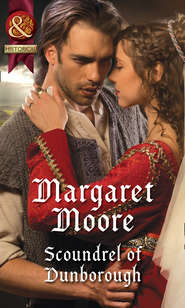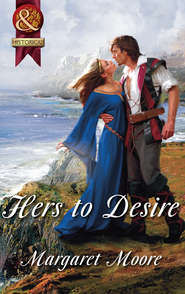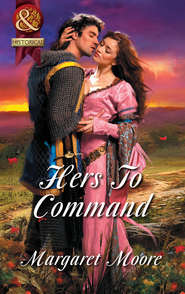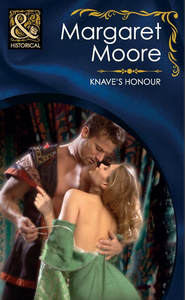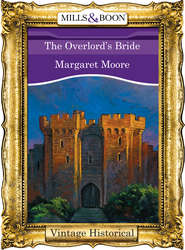По всем вопросам обращайтесь на: info@litportal.ru
(©) 2003-2024.
✖
The Welshman's Way
Настройки чтения
Размер шрифта
Высота строк
Поля
He passed by what appeared to be an abandoned farm. Two burned shells of buildings gave evidence of some disaster, and Dafydd’s lips curled in disgust, for he did not doubt that he was looking at some Norman’s handiwork. Perhaps the poor peasant had been unable to pay his tithe, or had once been of an important family and could not mask the pride that he still bore. Maybe he had had a pretty daughter who was not flattered by a Norman’s attentions,
Dafydd shook his head to clear it of such thoughts, and instead wondered just how far away lay the castle of Lord Trevelyan and the manor of Morgan, the Welshman who had married Trevelyan’s daughter. He would have to find out, and take great care that he came not near there. If he was recognized, his freedom would not last long beyond that moment.
Dafydd decided he would stay on the road until he drew near to the village. It was a bit risky, but the way was much easier on the road, and the air cooler. Once near the village, he would take greater care, although he did hope that he would be able to venture into an alehouse to get a better grasp of which way to go and purchase some other garments.
The road entered a narrow valley, heavily forested. Fallen leaves from years gone by made a thick covering on the road, which deadened the sound of his horse’s hooves. Young ferns were appearing at the edge of the way, and wildflowers provided a splash of yellow and pink. A slight breeze stirred the newly budding branches, and despite the springtime beauty, Dafydd’s first thought was that the dead leaves and rustle of the branches would effectively mask the sound of creeping men. In fact, this place was an ideal spot for an ambush. He had little enough to tempt thieves, but he knew there were many men who had even less. They would not care who they robbed and murdered, either, whether Norman or Welsh, noble or peasant.
Dafydd scanned the trees, trying to discover by senses too little used of late if he was being watched.
He never should have remained in the monastery as long as he did. He had grown too soft.
Suddenly he paused, cocked his head and listened. From somewhere up ahead came the familiar sounds of metal on metal and the shouts of men in battle.
Sliding from his horse, he pulled his sword from the scabbard tied onto his saddle. The road curved off to his right, around the wooded rise. If he went straight up the rise and through the trees, he might be able to see what was happening on the other side without being noticed. It was not his desire to interfere, simply to see who was fighting and how it might affect his own progress. He led the horse into some covering underbrush and began to move cautiously through the trees.
His long, cumbersome woolen robe got caught on a bramble bush. He paused to untangle it, and it was then he heard the woman’s terrified scream. For an instant, he was paralyzed, powerless like the boy he had been. An image, a name on his lips...and then he felt the hot blood of anger burst into his heart. With a curse, he tore off the garment, threw it onto the ground and dashed toward the top of the rise clad only in his linen breeches. When he was near the top, he began to creep forward slowly and stealthily, scanning the road below, his pulse throbbing through his body, gripping his sword so tightly his knuckles were as white as a lamb’s fleece.
He could see what looked like a band of thieves attacking a small group of mounted travelers. The ragged, rough men on foot had surrounded two noblemen, one mounted woman—a nun, it seemed—and some armed soldiers. The nun’s horse pranced nervously, but she controlled it very well while the noblemen, surely Normans, fought with great skill and determination. He could tell from the calls, shouts and orders that the attackers were Welshmen. Dafydd did not think these men had any motive other than robbery, as three of them were swiftly making off with the pack animals and leaving the guards alive. If rebellion was their motive, they would have killed the soldiers.
Nor did he think the lady and her escort had much to fear. The Normans were skilled fighters and well armed. The thieves were only holding them off as best they could until the packhorses were gone.
With a shuddering sigh, Dafydd moved back, still watching, more from an interest in seeing the Normans’ fine swordsmanship than concern for any of the combatants.
And then one of the ragged band grabbed hold of the bridle of the nun’s horse before swinging himself onto the animal behind her. The woman screamed and one of the noblemen twisted to look at her as the outlaw kicked the horse to a gallop, back along the road in the direction from which Dafydd had come.
What did that fellow want with her? Ransom, perhaps, or something more?
Quickly Dafydd sprinted through the woods, ignoring the brambles scratching his naked chest, legs and arms. He ran as fast as he could to where his horse waited and then he stood perfectly still.
He heard something off to his right. A struggle. Harsh commands. Once more he plunged into the forest, following the noises. The achingly familiar noises, from the day his sister was raped and killed by the Norman soldiers who had murdered their parents. How Gwennyth had tried to fight them! They had not seen the boy hiding in the trees, alone. But Gwennyth had. In the moments before she died, she had turned her head and looked at him. He would never forget her pain-racked eyes, or that her last effort had been to mouth his name.
Dafydd came to a glade. The thief was there, the woman on the ground and struggling beneath him, screaming curses and trying to scratch the outlaw’s face.
Dafydd had been helpless to protect Gwennyth and his parents that terrible day. He was not helpless now, and whether this woman was Norman or Welsh did not matter, and whether this fellow merely wanted to hold her for ransom or not did not matter.
Dafydd ap Iolo, Welsh rebel and outlaw, a man who had been fighting the Normans since he was ten years old, forgot that he had decided his fighting days were finished. With a ringing battle cry, he raised his weapon and attacked.
Chapter Two
“How dare you lay a hand on me! My brother will kill you if you hurt me! How much do you want? Roger will pay!” Madeline cried as she struggled against her captor. Despite her fear and panic, she knew she was worth much more alive and unharmed than shamed and dead. She also realized that he was only slightly taller than she was, and although he was stronger, he was not much bigger.
He gripped her flailing arms tighter. “Useless it is to fight, woman,” he snarled in barely understandable Norman French, his Welsh accent strong and his voice guttural. “Or killing you I will be. Worth a lot, you are.”
Suddenly a bloodcurdling cry rent the air. For an instant, Madeline saw surprise in the outlaw’s face before he rolled off. Desperate to get away, Madeline twisted and crawled as quickly as her shaking legs would let her toward some large bramble bushes. If she could but get out of sight!
In her haste, she ignored the clang of sword on sword, the exchange of curt, unfamiliar words and what she was sure was Welsh profanity until she was in the cover of the bushes. Only then did she turn to look at who had come to her rescue.
It was not Roger. Or Sir Albert. Or anyone she had ever seen before. Her savior was dark, tall and nearly naked, well built, muscular and, by his stance, a man who knew how to fight. His long, black hair hung to his shoulders, obscuring much of his face. She felt as if some ancient warrior god of the Britons had come to life to save her.
Then, as he circled his foe, she saw that his broad right shoulder was marred by a massive scar and he bore the mark of another serious wound on his left side. Yet the most startling thing about him was the intense concentration and hard line of his mouth as he stared at his opponent. Even Roger had not looked so completely determined when the outlaws had attacked.
Whoever he was, wherever he came from, she had never been happier to see anyone in her life.
Her rescuer continued to circle the outlaw, his stance wary like a cat couched to spring. The outlaw, whom she now saw was but a youth, was on his feet and snarling like a cornered rat. The two opponents swayed from side to side, swords held in both hands low to the ground, waiting. Watching.
Abruptly the man raised his sword. The outlaw did likewise and the clash of the weapons resounded through the trees. The outlaw’s sword slid along the other’s blade, seemingly direct for the man’s chest. Madeline opened her mouth to shout a warning, but before she did, the man twisted his hands, disengaging his weapon, stepped back and swung his sword in a great arc, striking the outlaw in the leg, the whole action accomplished before she could make any sound. Both men cried out and fell to the ground at the same time, the outlaw clutching his bleeding leg and the other his shoulder.
The outlaw’s wound was not a severe one, however, and he lifted his sword and ran straight at his adversary as the man staggered to his feet. The man moved to avoid the blow, then swung his sword again.
He missed. But as the outlaw ran by, he stuck out his foot, tripping the fellow, who sprawled in the dirt. When the outlaw tried to get up, the other man lifted his sword and struck him on the head with the hilt. With a low moan, the outlaw slumped unconscious to the ground.
The other man dropped his weapon and stood panting heavily, his hands on his knees. Sweat dripped from his forehead and muscular chest, and his shoulder-length hair still shrouded his face.
Madeline crept out of the underbrush. Unsure what to do now, she tugged her wimple back into place, adjusted her disheveled clothing and tried to regain some measure of self-possession. She kept her eyes on the stranger, however, wary of him. Mother Bertrilde had painted the world outside the convent walls as filled with all manner of evils and evil men, and after what had just happened, Madeline was not so inclined to view Mother Bertrilde’s ideas with as much skepticism as had been her wont.
After a long moment broken only by the man’s panting, he raised his eyes and looked at her. Suddenly her heart started to pound as if she had been the one doing battle. What a strange expression was in his dark, piercing eyes! As if he were surprised to see her there, and yet, had he not deliberately come to her rescue? Risked his own life for hers?
She quickly told herself that she felt so oddly because she had never seen such a man in all her cloistered life. What was it about him that affected her so? He was undeniably handsome, with his dark, searching eyes, and his relaxed lips had a sensuous quality she had rarely seen before. But there were handsome men in her brother’s entourage. He was possessed of undeniable strength and had wielded his sword with what she knew had to be great skill. Yet her brother and other men had strength and skill.
He had more than all that. In a way, he seemed almost savage in his ferocity, but he was too controlled to be brutally cruel. She did not doubt that he could have killed the outlaw with ease, yet he had not.
Perhaps it was only that he had come to her aid. No, there was something more, something personal in the intense dark eyes that moved her beyond admiration for a handsome face, strong body and battle prowess, and gratitude.
His expression changed, altered into something that made her curious and excited and overwhelmed, all at once. Then she knew, without any doubt and although she had spent the last years of her life in the exclusive company of women and the old priest who came to say mass at the convent, that this man, this warrior, was looking at her not as a student or a novice, or as a highborn noblewoman. He was regarding her simply as a woman. It was so new, so intoxicating...so wonderful. “Who...who are you?” she asked, unable to bear the silence any longer.
He blinked, rose slowly until he stood upright and started to walk away. His dismissive action recalled her attention to her perilous situation, although she found she no longer feared him. After all, he had helped her and was prepared to leave her, so he obviously had nothing to do with the attack.
“I thank you, sir, for your aid,” she said, hurrying after him. “My brother will be happy to reward you.”
He kept walking, as if he intended to leave her there, with the unconscious thief and who knew how many conscious ones lurking nearby. She grabbed his arm. He glanced at her, then her hand and she flushed and stepped away. “I have to get back to my brother.”
He made no answer, although his dark gaze didn’t leave her face.
“Will you not help me? I...I do not know where I am and there may be other thieves about.”
He started to walk again.
She quickly circled around him. “What about that outlaw? We cannot leave him there like that. He should at least be bound, should he not?”
The man only shook his head and kept going. She trotted after him, puzzled by his behavior. Surely he had not saved her only to abandon her to her fate.
They reached an incredibly ugly roan horse placidly tearing up grass near a large oak as if nothing of any significance had happened. The man reached down and picked up a garment, which he pulled over his head.
Her nerves strained, her breathing coming in labored pants, Madeline had had enough. “Sir! I am Lady Madeline de Montmorency and I demand that you assist me to return to my brother and his men. I am very grateful to you, of course, but truly—” She finally noticed what he was wearing. “You are a priest?”
He did not respond, except with another silent stare.
“Or a lay brother, perhaps. Yes, that’s it, surely. A lay brother. No priest could wield a sword like that. You must have been a soldier. But why...oh, I understand!” she surmised, calling to mind some stories she had heard in the convent. “You are under a vow of silence. For penance?”






